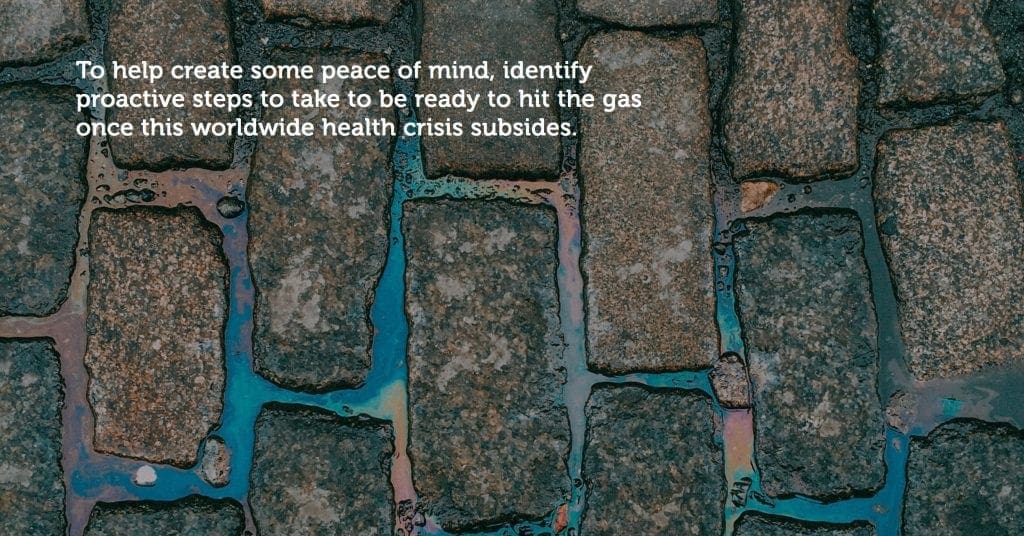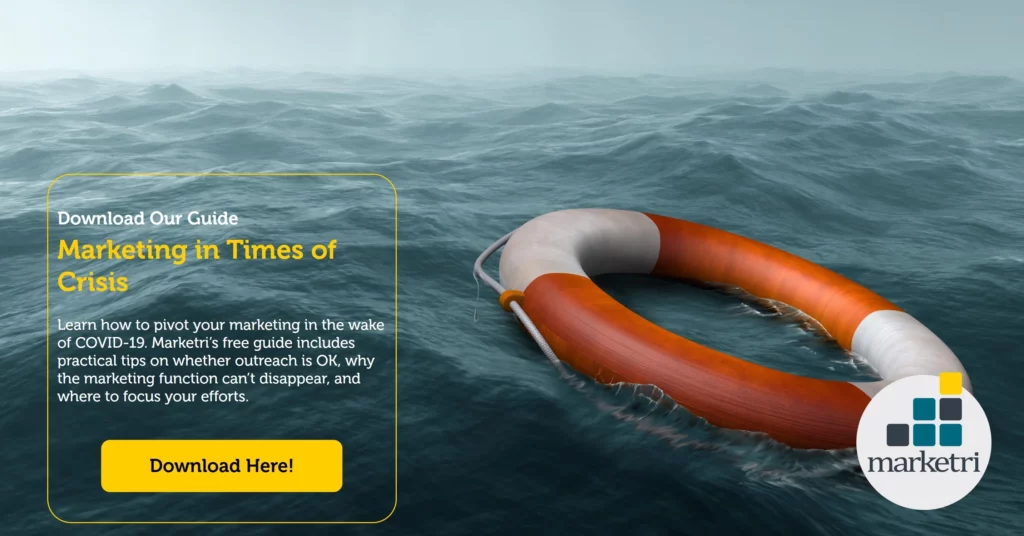Don’t Let Marketing Disappear in a Crisis
The coronavirus is spreading daily, worldwide, and it’s
scary. Few of us have experienced a global pandemic before — the last one was
the Spanish Flu in 1918. Every day more cases of COVID-19 are announced. Reports
of known personalities and anonymous cases continue. Travel restrictions have
increased. The NBA season is suspended. March Madness is cancelled. The
seriousness of the threat to human health and welfare is setting in.
You’ve likely received reassuring messages from companies you
interact with, noting continuity strategies or new measures for sanitation and
safety. Underneath that reassurance, executives of Fortune 100s, small business
owners (like me), and hourly workers are worried about the true economic impact
of the pandemic.
I take comfort in the planning taking place to keep citizens
safe, and I feel that planning in general gives me a measure of control. Instead
of being reactive – and fighting the urges to panic, hoard, sterilize – it’s
empowering to plan and be proactive.
In doing so, I do feel some similarities to the economic
crisis of 2008, when I was four years into building Marketri. I remember the
anxiety I felt for the future of my business, and I think some of the insights
I gained from that time are applicable today.

Plan for Peace of Mind
In a crisis, it’s a good idea to take stock and tighten the
reins where you can. In business, this can mean establishing or revisiting your
marketing plan.
If you don’t already have a strategic marketing plan, now is
a great time to develop one. Why now? Because it will give you greater
confidence in your ability to retain your business-as-usual balance at a time
when the ground is shifting rapidly. Considering your current situation –
strengths and weaknesses, target audience, brand value proposition, market
opportunities – can also help you build a more effective short-term “emergency”
plan.
Don’t get knocked off your game. Instead, identify proactive steps to take to be ready to hit the gas once this worldwide health crisis subsides. If you’re working from home and gaining time back from in-person meetings, you can roll it into reflection, reassessment, and forward-looking plans for your business future.
Consider Changing Marketing Course
You’d be forgiven for wanting to hide in a cave for the next
month to avoid illness and the stream of notifications of rising risks. Still,
you can’t shut down your business, and you certainly shouldn’t cut your
marketing investment.
However, you may want to think about changing course. Given
the sudden shift in people’s focus and priorities, your current marketing
outreach might need reassessment. Most Americans are unlikely to dig into e-newsletters,
employee spotlights, or industry “top tips”
blog posts.
So, don’t keep targeting your audience with marketing that doesn’t speak to their needs or that might be interpreted as in poor taste. Instead, consider communicating what your business is doing about the coronavirus, and point out how your products or services can help others handling this crisis.
Emails or tips around “non-obvious”
business practices will likely be embraced. By non-obvious, I mean software-as-a-service
companies might want to skip emails telling customers to wash their hands. But
they could provide a lot of value by offering expertise on managing remote
workers and technology.
Reorient Sales
Your business may also need to reorient its sales team. Sales may fall below expectations in the near term, and sales professionals will, naturally, feel more pressure and could push harder. That’s likely to backfire. Companies want to work with helpful strategic partners in difficult times — not hard-charging salespeople.
For example, your marketing and sales teams could
collaborate on a campaign to reach out to top customers personally. They could
ask how the pandemic is affecting business and explore what you can do to
help. After that outreach, you could also host an internal meeting to
share findings and strategize ways your company could be authentically helpful.
Those efforts would help build lasting loyalty.

Invest in Your Marketing Infrastructure
Even if you have to change direction or revisit the pace of
your marketing campaign, that doesn’t mean your marketing team needs to sit idle.
They could be building up a backlog of marketing content. In
2008, I had a civil engineering client double down on content creation. Once
the crisis subsided, they were poised and ready with an abundance of marketing
messages and collateral.
They could also work through the big and little tasks that typically
fall by the wayside in day-to-day marketing. So, take advantage of this
opportunity to review and improve your assets:
- How clean is the data in your CRM? Could you
better segment your audiences? - What’s working
or not working on your website? - How can you optimize your site and its pages?
- Have you looked at your social pages
lately? - Can you update your LinkedIn profile or your
company’s? - Could your company brochures and service sheets use
an update? - Can you create a downloadable ebook to qualify
future leads?
If you don’t have marketing automation software, this is a
good time to evaluate the options and implement the technology. That way you’ll
be ready to scale up when it’s appropriate. If you already have automation, you
might create new workflows or streamline existing ones.
Final Thoughts
COVID-19 has everyone spinning. In business, we can stay on track by taking stock, possibly changing course, and planning for the future. Those who haven’t really embraced marketing before could even take this as a time to try.
It’s like investing in a declining stock market. It can be scary, but the returns can be considerable.
Once the pandemic is under control, some companies will
struggle to get back into a groove. But typically, among B2B customers, there
will be renewed energy to get back to normal. That’s perfect timing for
aggressive outreach, and you could be getting ready now for that very moment.
For leaders ready to take their companies to the next level, investing in marketing is a brave step worth taking. When business-as-usual isn’t really an option, it’s a great opportunity to plan for business-as-it-could-be.






